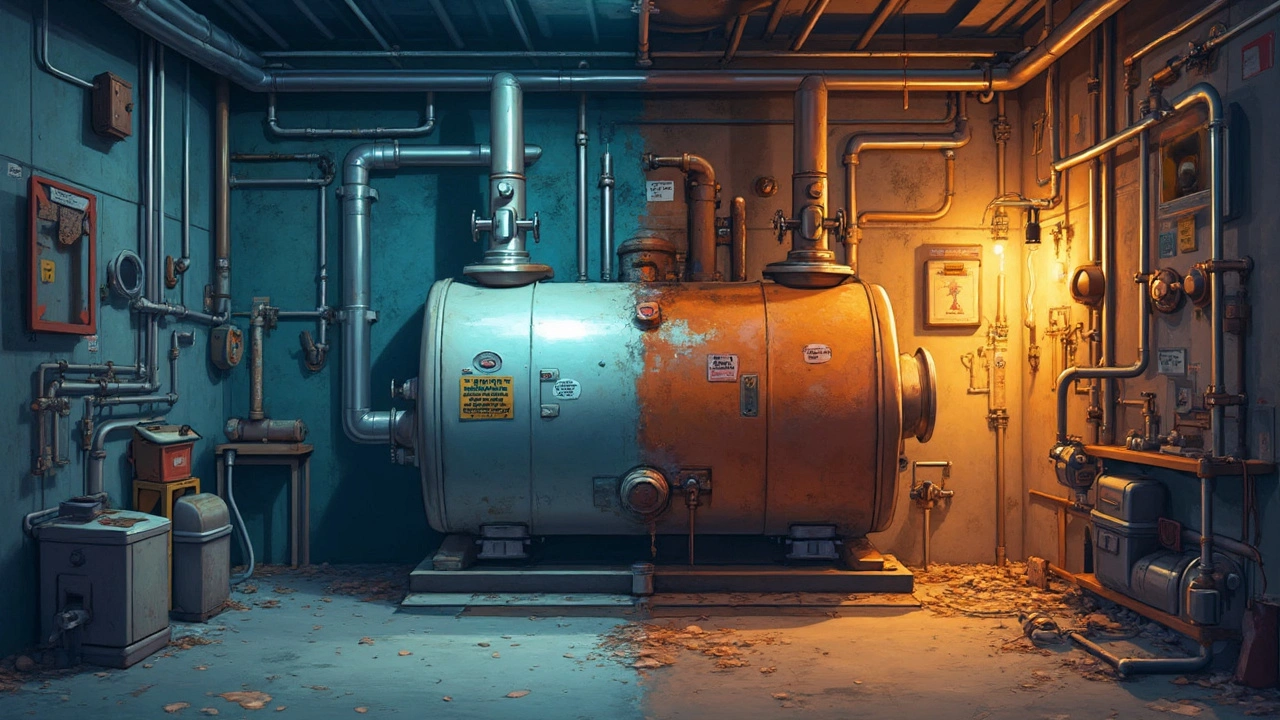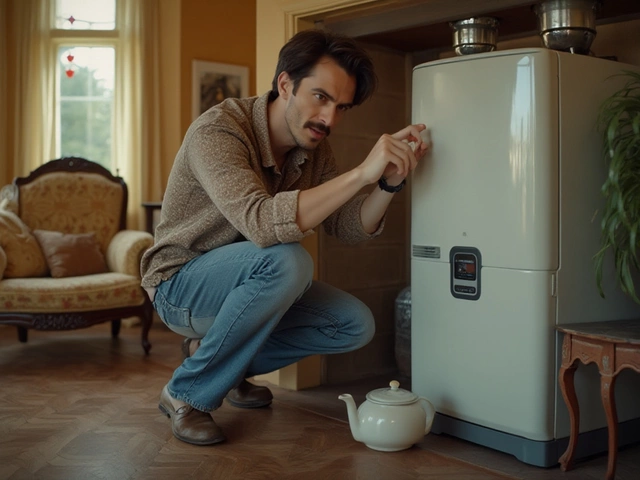Wondering how often you should service your boiler? You're not alone. Homeowners everywhere face the same question as winter approaches or when that trusty old boiler starts making strange noises. Regular servicing is pretty important if you want to keep your home warm without unexpected hiccups.
Ideally, boilers should be serviced once a year. This annual check-up can help catch any problems early, ensuring your heating system runs smoothly and efficiently. Think of it like a doctor's appointment for your boiler. During this service, an engineer will check for any wear and tear, ensure everything's working as it should, and make any necessary adjustments.
But why wait for a service? Keep an eye out for signs your boiler might need attention before that annual visit. Listen for unusual bangs or whistles, check the pilot light, and notice if your energy bills are creeping up. Ignoring those can lead to bigger, costlier problems down the line.
- Why Regular Servicing Matters
- Ideal Service Frequency
- Signs Your Boiler Needs Attention
- Tips for Maintenance Between Services
- Risks of Skipping Service
- Choosing the Right Professional
Why Regular Servicing Matters
Let's talk about why keeping up with regular boiler service is more than just ticking off a list on your annual home maintenance. It's all about safety, efficiency, and extending your boiler's life.
Your Safety First
A boiler that's not checked regularly can become a risk. Carbon monoxide leaks, for example, are a silent danger that can go unnoticed if you're not vigilant. Regular checks ensure there are no hazardous gas leaks, keeping your home safe.
Efficiency and Performance
A boiler that's serviced annually operates more efficiently. Engineers clean parts of the boiler, ensuring that it runs smoothly. A clean and well-maintained boiler uses less energy, which lowers your fuel bills. So, that regular servicing isn't just an expense; it's an investment. By ensuring boiler maintenance, you could actually save money in the long run.
Prolonging Boiler Lifespan
No one wants the hassle of replacing a boiler sooner than necessary. Regular boiler service frequency means engineers catch wear and tear early, making fixes that extend the life of your boiler by years.
Potential Hidden Costs
Neglecting that regular service can mean hefty bills later. Repairs on a failed boiler can be costly. Worse, imagine coming home on a freezing day to a cold house because the boiler broke down. Regular servicing helps avoid emergencies.
| Benefit | Annual Cost Savings |
|---|---|
| Improved Efficiency | Up to 10% |
| Avoiding Breakdowns | Avoid repair costs of $300-$500 |
Keeping up with boiler maintenance might feel like a chore, but it brings peace of mind. Your home stays warm, your family stays safe, and you avoid unexpected costs. So mark that calendar for your annual service!
Ideal Service Frequency
When it comes to keeping your boiler in top-notch condition, understanding the boiler service frequency is key. Generally, boilers should be serviced once a year. This standard timeframe works well for most households and types of boilers, ensuring that any issues are caught early, and your heating system runs efficiently.
However, some cases might require more frequent checks. If you’ve got an older boiler, for instance, it's wise to get it looked at twice a year. Similarly, if you rely heavily on your heating system due to a harsher climate or a big family, scheduling an extra service could save you a lot of hassle down the line.
What Happens During an Annual Service?
During a routine service, a professional will:
- Inspect the boiler's components for wear and tear.
- Clean parts that accumulate soot and dust.
- Test the levels of carbon monoxide to ensure safe operation.
- Check the connections and pressures.
- Execute minor repairs or adjustments as needed.
Special Considerations
If you're not sure about your boiler's last service, don’t worry. Checking with your service records or contacting a reputable boiler repair professional can help you get back on track. Also, keep in mind that seasonal changes might affect your boiler's performance. It's a good idea to monitor its behavior as temperatures drop or rise significantly.
DIY Tips for Peace of Mind
In between these professional check-ups, here are a few simple things you can do:
- Regularly bleed your radiators to ensure even heating.
- Check the pressure gauge monthly; it should be around 1 to 2 bars.
- Listen for unusual noises like clanging or banging.
Following these tips could help prolong the life of your boiler, improve efficiency, and ultimately save money.
Signs Your Boiler Needs Attention
Spotting signs that your boiler is in trouble can save you a lot of headaches and money. Who wants a cold home or a surprise repair bill, right? Here are some things to keep an eye on.
Strange Noises
If your boiler's knocking, whistling, or banging, it's probably not because it wants to join the band. These noises could mean sediment build-up or air in the system. It's your boiler's way of saying it needs a check-up.
Inconsistent Heating
Is your shower running hot and then suddenly cold? Or maybe your radiators have cold spots? These could be red flags that your boiler's struggling to spread the heat evenly.
Spike in Energy Bills
We've all been there: opening the energy bill and gasping in shock. If your bills are shooting up without any change in usage, your boiler might be working overtime. A well-maintained system runs more efficiently, keeping costs predictable.
Pilot Light Issues
Keep an eye on that pilot light. If it's going out often or has a yellow flame instead of a blue one, there's a possible ventilation issue. It might indicate carbon monoxide risks, which is serious stuff.
Leaks
Water around the boiler is a big no-no. Even small leaks can suggest internal problems, and nobody wants water damage or corrosion to deal with. Spotting a leak early can prevent more extensive repairs.
- Strange noises might signal a bigger issue.
- Watch out for inconsistent heating in showers and radiators.
- A sudden increase in energy bills might mean inefficiency.
- Check if the pilot light is steady and blue.
- Look for any leaks around your boiler.
If you're noticing any of these signs, it could be time to call in the pros. Getting on top of these issues early can avoid more expensive repairs and keep your boiler purring smoothly.

Tips for Maintenance Between Services
Keeping your boiler in tip-top shape isn't a once-a-year gig. There's plenty you can do between those yearly boiler maintenance appointments to ensure things run smoothly.
Check the Pressure
Ever heard that gurgle from your heating system? It's often a pressure issue. Every couple of months, take a peek at the boiler's pressure gauge. Ideally, it should hover between 1-1.5 bars when the system is off. Adjust if necessary; most boilers have an easy way to do this.
Bleed Your Radiators
Cold spots aren’t just annoying—they can be a sign that trapped air is getting in the way. Bleeding radiators helps. This simple task releases air pockets, allowing hot water to flow freely. Just grab a radiator key, turn it slightly until you hear a hiss, and tighten it back up once water drips out.
Keep the Area Clear
Your boiler needs space to breathe. Ensure there’s no clutter around it—good airflow helps it run better and safer.
Listen and Look
Strange noises or unexpected shutdowns? These could be red flags. Catch problems early by paying attention to changes in how your boiler sounds or functions.
"A little regular attention between services can save you from costly repairs," says John Lansley, Heating Engineer at UK Boilers.
And hey, don't forget to check for leaks or drips. Water where it shouldn't be can spell trouble, hinting at potential damage inside the system. Keep an eye out and act fast if you spot anything unusual—it's always better to catch problems early.
With these simple tips, you can keep your boiler ticking over nicely, saving money and avoiding unnecessary headaches. Remember: a little regular attention goes a long way!
Risks of Skipping Service
Skipping your annual boiler service frequency might seem like a harmless way to save some cash, but it could cost you big time in the long run. Not keeping up with regular checks is like playing fast and loose with one of the most critical systems in your home.
First off, there's the safety factor. Boilers, especially older ones, can be dangerous if they're not properly maintained. A neglected boiler can lead to carbon monoxide leaks, which are odorless and extremely hazardous. Regular servicing includes a thorough check of your boiler's flue and combustion, drastically reducing this risk.
Then there's the efficiency angle. A well-maintained boiler runs more efficiently. If you skip services, your boiler might start using more energy for the same amount of heat, driving those energy bills through the roof.
Unexpected Breakdowns
Another biggie is unexpected breakdowns. Imagine your boiler breaking down in the middle of a freezing winter night! Annual servicing can spot potential issues before they become major problems. Sure, you might think everything's fine now, but that doesn’t mean something isn’t quietly brewing inside that could take you by surprise.
Cost of Neglect
There's also the financial hit. Small repairs discovered during regular service are generally much cheaper than a major repair for something that's spiraled out of control. Plus, a regularly serviced boiler tends to last longer, delaying the need for a costly replacement. Think of it as investing a little now to save more later.
| Issue | Estimated Cost |
|---|---|
| Minor Repair (Serviced) | $100 - $200 |
| Major Repair (Neglected) | $500 - $1,000 |
| Replacement | $2,000 - $5,000 |
Keeping on top of your boiler maintenance isn't just about staying warm. It's about keeping safe, saving money, and avoiding those middle-of-the-night shivers. Think of it as a little TLC for your boiler that gives a lot back.
Choosing the Right Professional
When it comes to keeping your boiler in top shape, finding the right professional is just as important as the service itself. You want someone who knows their stuff, is reliable, and won't leave you with more problems than you started with.
Research and Recommendations
First step? Do your homework. Start by asking friends, family, or neighbors for recommendations. Word of mouth can often lead you to some trustworthy professionals. You can also check online reviews and ratings. Websites like Trustpilot or local community groups can offer insights into local service providers.
Experience and Certification
Experience is key. Look for professionals with several years of expertise in boiler maintenance. Don't hesitate to ask for their credentials either. They should be certified by recognized industry bodies. In the UK, for instance, make sure they're on the Gas Safe Register. It's a legal must-have for anyone dealing with gas appliances.
Quotes and Services Offered
Before settling, gather quotes from a few different places. This gives you an idea of the going rate and helps weed out any over-the-top quotes. Compare what's included in the service; some might offer value-added services like safety checks or efficiency advice.
Customer Service
Another thing to consider is how they treat their customers. Are they responsive? Do they make you feel valued? Good customer service often mirrors the quality of their work. A boiler maintenance expert who answers your questions and explains their process is worth keeping around.
By following these steps, you increase your chances of finding a professional that keeps your boiler running smoothly all year round.





